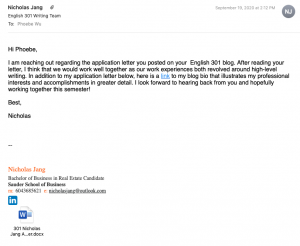Strengths and Weaknesses
Reflecting back on my first post, I believe I have accomplished all the objectives I had laid out for myself at the beginning of the course. Coming out of the course, I have become more confident in writing professional correspondence. I now know the importance of utilizing you-attitude in writing emails. The growth I am most proud of is learning how to properly write a cover letter. Prior to this course, I was always unsure of how to word cover letters professionally and what to include in a cover letter. I was worried that the cover letter I wrote would sound unprofessional or contain too much flattery. After this course, my confidence in writing cover letters has greatly improved.
Something I still consider a weakness of mine is my LinkedIn profile. I did not have a LinkedIn profile prior to this course and was eager to learn how to make an outstanding profile. It was a great experience getting to learn from my peers who have had LinkedIn profiles for a while and know the ins and outs of the website. However, I just have not had the chance to expand my profile to the extent that I wish to. In the future, I plan on continuing to work on improving my LinkedIn profile by using all the tips I’ve learned from my peers and expanding my connections.
Supporting my Future Career
I am confident that the skills I have learned throughout this term will benefit me when applying for jobs and throughout my career. My cover letter writing skills have improved and I am now more prepared to network with my LinkedIn profile and WebFolio. Generally speaking, every job requires one to be a good communicator and this course has allowed me to further hone my skills. The peer review and the email memorandum writing practice I have had throughout the term will definitely transfer well to writing code reviews and corresponding to coworkers at my future career.


